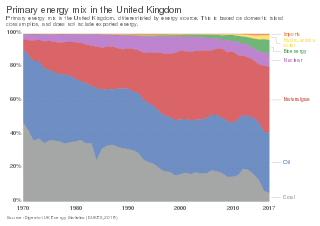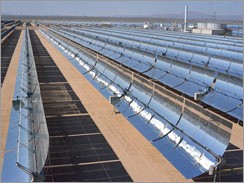Related Research Articles

Energy conservation is the effort to reduce wasteful energy consumption by using fewer energy services. This can be done by using energy more effectively or changing one's behavior to use less service. Energy conservation can be achieved through efficient energy use, which has some advantages, including a reduction in greenhouse gas emissions and a smaller carbon footprint, as well as cost, water, and energy savings.
The United Kingdom's Climate Change Programme was launched in November 2000 by the British government in response to its commitment agreed at the 1992 United Nations Conference on Environment and Development (UNCED). The 2000 programme was updated in March 2006 following a review launched in September 2004.

The Climate Change Levy (CCL) is a tax on energy delivered to non-domestic users in the United Kingdom.
The Renewables Obligation (RO) is designed to encourage generation of electricity from eligible renewable sources in the United Kingdom. It was introduced in England and Wales and in a different form in Scotland in April 2002 and in Northern Ireland in April 2005, replacing the Non-Fossil Fuel Obligation which operated from 1990.

The Carbon Trust was developed and launched in the UK over 1999-2001 as part of the development of the Climate Change Levy (CCL), a tax on business energy use that still operates today. The Carbon Trust was originally funded by around £50m of UK tax revenue generated from the Levy to help businesses reduce energy costs and therefore offset the additional cost of paying the CCL. The establishment of the Carbon Trust was announced in the 2000 UK White Paper "Climate Change - the UK Programme". It was launched alongside the introduction of the CCL in March–April 2001.

Climate change mitigation is action to limit climate change. This action either reduces emissions of greenhouse gases or removes those gases from the atmosphere. The recent rise in global temperature is mostly due to emissions from burning fossil fuels such as coal, oil, and natural gas. There are various ways that mitigation can reduce emissions. These are transitioning to sustainable energy sources, conserving energy, and increasing efficiency. It is possible to remove carbon dioxide from the atmosphere. This can be done by enlarging forests, restoring wetlands and using other natural and technical processes. The name for these processes is carbon sequestration. Governments and companies have pledged to reduce emissions to prevent dangerous climate change. These pledges are in line with international negotiations to limit warming.
Domestic housing in the United Kingdom presents a possible opportunity for achieving the 20% overall cut in UK greenhouse gas emissions targeted by the Government for 2010. However, the process of achieving that drop is proving problematic given the very wide range of age and condition of the UK housing stock.
Various energy conservation measures are taken in the United Kingdom.

The energy policy of the United Kingdom refers to the United Kingdom's efforts towards reducing energy intensity, reducing energy poverty, and maintaining energy supply reliability. The United Kingdom has had success in this, though energy intensity remains high. There is an ambitious goal to reduce carbon dioxide emissions in future years, but it is unclear whether the programmes in place are sufficient to achieve this objective. Regarding energy self-sufficiency, UK policy does not address this issue, other than to concede historic energy security is currently ceasing to exist.

The Climate Change and Sustainable Energy Act 2006 is an Act of the Parliament of the United Kingdom which aims to boost the number of heat and electricity microgeneration installations in the United Kingdom, so helping to cut carbon emissions and reduce fuel poverty.

The energy policy of the European Union focuses on energy security, sustainability, and integrating the energy markets of member states. An increasingly important part of it is climate policy. A key energy policy adopted in 2009 is the 20/20/20 objectives, binding for all EU Member States. The target involved increasing the share of renewable energy in its final energy use to 20%, reduce greenhouse gases by 20% and increase energy efficiency by 20%. After this target was met, new targets for 2030 were set at a 55% reduction of greenhouse gas emissions by 2030 as part of the European Green Deal. After the Russian invasion of Ukraine, the EU's energy policy turned more towards energy security in their REPowerEU policy package, which boosts both renewable deployment and fossil fuel infrastructure for alternative suppliers.

A low-carbon economy (LCE) or decarbonised economy is a concept for a desirable economy which has relatively low greenhouse gas (GHG) emissions per person. GHG emissions due to human activity are the dominant cause of observed climate change since the mid-20th century. There are many strategies and approaches for moving to a low-carbon economy, such as encouraging renewable energy transition, efficient energy use, energy conservation, electrification of transportation, carbon capture and storage, climate-smart agriculture. An even more ambitious target than low-carbon economies are zero-carbon economies with net zero emissions. An example are zero-carbon cities.

The availability and uptake of green electricity in the United Kingdom has increased in the 21st century. There are a number of suppliers offering green electricity in the United Kingdom. In theory these types of tariffs help to lower carbon dioxide emissions by increasing consumer demand for green electricity and encouraging more renewable energy plant to be built. Since Ofgem's 2014 regulations there are now set criteria defining what can be classified as a green source product. As well as holding sufficient guarantee of origin certificates to cover the electricity sold to consumers, suppliers are also required to show additionality by contributing to wider environmental and low carbon funds.

The National Energy Foundation (NEF) is an independent British charity, established to improve the use of energy in buildings.

Greenhouse gas emissions by Australia totalled 533 million tonnes CO2-equivalent based on greenhouse gas national inventory report data for 2019; representing per capita CO2e emissions of 21 tons, three times the global average. Coal was responsible for 30% of emissions. The national Greenhouse Gas Inventory estimates for the year to March 2021 were 494.2 million tonnes, which is 27.8 million tonnes, or 5.3%, lower than the previous year. It is 20.8% lower than in 2005. According to the government, the result reflects the decrease in transport emissions due to COVID-19 pandemic restrictions, reduced fugitive emissions, and reductions in emissions from electricity; however, there were increased greenhouse gas emissions from the land and agriculture sectors.
A feed-in tariff (FIT) is paid by energy suppliers in the United Kingdom if a property or organisation generates their own electricity using technology such as solar panels or wind turbines and feeds any surplus back to the grid. The FIT scheme was imposed on suppliers by the UK government, and applied to installations completed between July 2009 and March 2019.
The Energy Company Obligation (ECO) is a British Government programme. It is designed to offset emissions created by energy company power stations. The first obligation period ran from January 2013 to 31 March 2015. The second obligation period, known as ECO2, ran from 1 April 2015 to 31 March 2017. The third obligation period, known as ECO3, ran from 3 December 2018 until 31 March 2022. The fourth iteration, ECO4, commenced on 1 April 2022 and will run until 31 March 2026.

A consumer green energy program is a program that enables households to buy energy from renewable sources. By allowing consumers to purchase renewable energy, it simultaneously diverts the utilization of fossil fuels and promotes the use of renewable energy sources such as solar and wind.
National Action Plan for Climate Change (NAPCC) is a Government of India's programme launched in 2008 to mitigate and adapt to the adverse impact of climate change. The action plan is designed and published under the guidance of Prime Minister’s Council on Climate Change (PMCCC). The 8 sub-missions aimed at fulfilling India's developmental objectives with focus on reducing emission intensity of its economy. The plan will rely on the support from the developed countries with the prime focus of keeping its carbon emissions below the developed economies at any point of time. The 8 missions under NAPCC are as follows:
The Great British Insulation Scheme (GBIS) is an initiative launched by the UK government to enhance efficient energy use in residential properties. The scheme initially consulted on by the Department for Energy Security and Net Zero labelled as ECO+, reflects the UK's efforts towards environmental sustainability and the reduction of household energy costs.
References
- 1 2 3 Dawson, Catherine. Green Property: Buying, Developing and Investing in Eco-friendly Property, and Becoming More Energy Efficient. Kogan Page Publishers, 2008. p. 11–12.
- 1 2 3 4 "Energy Saving Trust – Profile at European Energy Network". Archived from the original on 2014-07-14. Retrieved 2014-07-12.
- 1 2 United Kingdom Energy Report. Enerdata, 2011. p. 7.
- 1 2 3 4 5 6 Energy Saving Trust – About Us
- 1 2 3 4 5 Energy Saving Trust. Sust-it .
- ↑ Jenkins, Dilwyn. Renewable Energy Systems: The Earthscan Expert Guide to Renewable Energy Technologies for Home and Business. Routledge, 2013. p. 15.
- ↑ Oshitani, Shizuka. Global Warming Policy in Japan and Britain: Interactions Between Institutions and Issue Characteristics. Manchester University Press, 2006. pp. 166–169.
- ↑ Owen, Gill. A Market in Efficiency: Promoting Energy Savings Through Competition. Institute for Public Policy Research, 1996. p. 11.
- ↑ Markus, T.A. (ed). Domestic Energy and Affordable Warmth. Watt Committee on Energy; British Gas. Routledge, 2005. p. 43.
- 1 2 Owen, Gill. Public Purpose Or Private Benefit?: The Politics of Energy Conservation. Manchester University Press, 1999. pp. 104–109.
- 1 2 3 Whitmarsh, Lorraine; Lorenzoni, Irene; O'Neill, Saffron (eds). Engaging the Public with Climate Change: Behaviour Change and Communication. Routledge, 2012. pp. 142–160.
- ↑ Oshitani, Shizuka. Global Warming Policy in Japan and Britain: Interactions Between Institutions and Issue Characteristics. Manchester University Press, 2006. pp. 184–186.
- ↑ Elliott, David. Energy, Society and Environment. Routledge, 2002. pp. 152–154.
- ↑ Energy Saving Trust Archived 2014-07-14 at the Wayback Machine at ManagEnergy
- ↑ "Energy Saving Advice Service" Archived 2014-07-14 at the Wayback Machine . In: DEVELOPING PARTNERSHIPS AND BETTER TARGETING: Delivering programmes for the benefit of the fuel poor. National Energy Action. 6 November 2013.
- 1 2 Carrington, Damian. "Energy Saving Trust funding cut by half". The Guardian . 21 January 2011.
- ↑ Energy Saving Trust — Certification
- ↑ Energy Saving Trust – Individuals
- 1 2 Committee on Climate Change. Building a Low-carbon Economy: The UK's Contribution to Tackling Climate Change; the First Report of the Committee on Climate Change. Great Britain: The Stationery Office, 2008. p. 232.
- ↑ Energy Saving Trust – Organisations
- ↑ Scottish Housing News (28 July 2020). "Over £2.9m in Ofgem energy redress funding awarded to UK charities". Dundee Press Agency Ltd.
- ↑ Shrestha, Priyanka (18 June 2021). "Ofgem's Voluntary Redress Scheme to be extended to community energy groups". Energy Live News. Energy Live News Ltd.
- ↑ "About us". Energy Redress scheme. Energy Saving Trust. 2018.
- ↑ Scottish Housing News (22 October 2021). "£11.5m available for charities through Ofgem's energy redress scheme". Scottish Housing News. Dundee Press Agency Ltd.